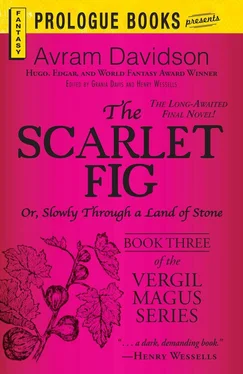It must not be thought that the King himself ate no dainties, and merely subsisted on meat, like a Hun; far from it. I recall it being mentioned that he was very fond of certain little cakes made of the finest sifted wheat flour, moiled in a mortar with oil of opium; also that he much liked small cheese tarts, the fillings of which were confected out of mothers’ milk, richer than that of ewes.
She wore much gold — rings almost as large as armils and armils almost as large as greaves and a coronet only slightly smaller than a crown. One might have thought her the Queen Dowager, did not the King Himself say, sometimes, something like this: “The weather has been beautiful, my wife, and I hope that you have enjoyed it much.” The Queen’s reply was to quarter a fricaseed peacock/pullet with her fingers and then to wipe her fingers on some bits of mealy bread and then to give the bits of bread to her small white doggies of the Malta breed. She seemed old, quite, quite old, this Queen; perhaps it was a marriage pro forma, a marriage for reasons of state; but, yet — One wondered, too, at the source of the gold. Had the King robbed it from the Arimaspeans or from shroffs or griffins or projected it by alchymical means in his own well-famed elaboratory or earned it by the more simple way of debasing his own currency?
At night the same small child (possibly the one named Ozymandias, who but then that King of the Cappadocians had had so many sons and they all had names, unlike those of a certain not very philoprogenitive King of Phrygia who merely gave his sons numbers), at night the same small child … not ever once out of the guest’s eyes for a moment long enough for a drop of wine to distill its way down the cup’s smooth sides — would by indulgence spend the night sleeping in the guest traveler’s tent upon a scarlet fleece after having lisped him a lullaby, perhaps the one in the Chrestomathy beginning
Little one, little one, eat thy millet-meal
With candied figs much rich in crystallized honey,
And Daddo shall capture sixteen lion cubs and,
Cutting out their claws and collions, make them
Into house-pets for thee
Though perhaps not. It would have been a rare guest not by now charmed out of all thoughts of suspicion. I would be such a rare one and would not have been there; had I ever been asked? Yes. The night would pass and the day and even it might be the month. Business would be done (one would not hurry business) and the guest would agree to sell his secret and … the King of Cappadocea after all not being able to guarantee the safety and security of guest and gear outside his own borders, see finally the guest philosopher and occymist accept a parchment of accompt scaled with several sundry seals, guaranteeing payment of … say … an hundred thousand golden solids to be paid over at the Agency of the Kingdom of Cappadocea in Mickelgarth, Byzantinope, that great city. And see (I would not see, merely I have heard) the traveler-alchemist in full good health and let him even travel a day’s march past the last of the Marches of Cappadocea and then see him well suddenly part his lips a bit puzzled and roll a bit his eyes bemused and fall silently off his horse or camel, and dead by the time he struck upon the foreign soil. And see the caravan-men, rather bored than otherwise, remove the rich gifts and the parchment of accompt and even the very clothing upon the immediately-buried body (immediately buried except for the head, of course, that being brought back to Cappadocea, for the King to look upon — once — after which it was laid upon an ant-hill until it was in such cleanly state to be set atop the Tower of Skulls; each Eastern King having his own Tower of Skulls, chiefly for the amusement and instruction of the children, but often for the instruction of others: principally that of the councillors, ministers, and wives of the aforesaid Kings of the East; and now and then their own heads … but this is already a sufficiently long digression ….)
And by the time the body of the foreign guest and occymist had slid off his mount for the last time, the King of the Very Valiant and Prosperous Kingdom of the Cappadocians and his dandeled son had taken the antidote both of them. In very vain for the guest to have thought I shall drink of every cup and eat of every dish and I shall take the most puissant antidote and thus beshrew the venom and I shall live long and richly, in vain.
For only the king of that country knew that poison (I did not know it, that is, not for certain, but I suspected that it had in its original form been sprinkled in the calyx of a flower (perhaps the simple shallow chalice of the wild white rose and the pink nectarium within) sure to be sipped of by at least one bee of the hive from which came the honey added to the wine for, not the first cup of wine, of one thereafter) and only the King of that country knew that antidote and only he knew also the necessary and essential manner of the taking it.
And here let me make mention, merely, of the kistos , a small knife, the handle of which is bound with the skin of a green viper or other poison snake, and can be used to cut venomous plants in safety.
So ergo let his manner be never so cultivated and let him discourse the poems of Pindar never so well and the science of Algibberonius and let him point out in the heaven Bootes, the cold Ox-Car, wherein shines bright Arcturus: I would have none of it, not even to be in the same country with it.
They say that King died poor, in exile and in want. But they say that he died old.
The Doge of Naples was too clumsy to be a poisoner, too simple to be a tyrant, too stupid to know one poet or one star from another; if there was a difference between the chameleon and the crocodile, he did not know it; he was even too slovenly to keep the pulp of the lemonade out of his beard. Let me , therefore, pluck it out and wipe it off as the price of living free of tyranny and poison. King Stork wears many crowns. Long live King Log!
As a further exemplum of what I have been saying (and as a sort of flourish, if you will), I went on to recite an exemplary paragraph. “ Menalaus of the light-hair led them to the house, to be seated on benches and on chairs. Then he said, ‘Let water for the hands be brought in a beautiful pitcher of silver and pour it out over a bowl of gold, that the guests may wash, and spread a polished table by their side. Your Serenity,” I said, “will not have failed to notice the alchymical — the occymal — symbols: ‘Menalaus of the light-hair’ is obviously the sun with its rays, and the pitcher of silver and the bowl of gold are, equally obviously, the — ” [6] And as for that Noting in the Odd-Bound Volume of The Notebook of Vergil Mage, on the third papyrus sheet set in between the parchment pages, that noting is set down here, thus: 1 2 3 4 5 l e m o n 3 2 1 4 5 m e l o n 1 2 3 4 5 m e l o n 3 2 1 4 5 l e m o n — as for that, The Matter sayeth this: seek ye the golded apples And further The Matter sayeth not.
The Doge would have failed to notice a golden scorpion with a silver sting unless it had stung him in a very private part; I was speaking over his head. Not either to any of the courtiers was I speaking, for though they were slyer they were not wiser. Among the guards lined up was one not at all a full-time guardsman, he was an armorer, frequently hauled up by the Camerlengo because he made such a good appearance with his strong body and his full black beard, when he would have much rather been working at the whetstone and the forge. I meant to fetch his attention, pique his interest, stimulate his understanding of the fact that a mage was not a mere magician. And when, as he some day must, he determined to leave the ducal service, it was my intention to engage him in my own; his hands made very neat repairs, I’d noticed. And his weapons’ edges were, among all, most keen. Tynus, his name was.
Читать дальше











